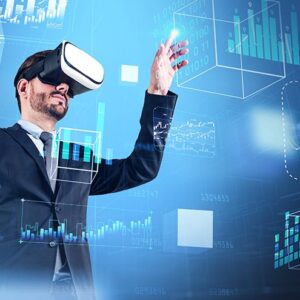In an age where classical computers are approaching their limits, quantum computing is emerging as the next technological revolution. Often described as a way to “harness the weirdness of quantum mechanics,” quantum computing promises to solve problems that are impossible for traditional computers — in areas like cryptography, climate modeling, drug discovery, and artificial intelligence.
But what exactly is quantum computing? How does it work? And why is it such a big deal?
Let’s explore this cutting-edge field of science and technology.
What Is Quantum Computing?
At its core, quantum computing is a radically different way of processing information. While classical computers use bits (which represent either a 0 or a 1), quantum computers use quantum bits, or qubits.
🌀 Qubits vs. Bits
A qubit is a unit of quantum information. Unlike a classical bit, which is binary, a qubit can exist in a superposition of states — it can be 0, 1, or both at the same time. This ability allows quantum computers to process a vast number of possibilities simultaneously.
Moreover, qubits can be entangled, meaning the state of one qubit is dependent on another — no matter how far apart they are. This is what Einstein famously called “spooky action at a distance.”
Key Principles Behind Quantum Computing
- Superposition
A qubit can hold multiple states at once, allowing quantum computers to explore multiple solutions in parallel. - Entanglement
When qubits are entangled, measuring one instantly reveals information about the other — enabling powerful forms of computation and communication. - Interference
Quantum algorithms use interference to amplify correct paths and cancel out incorrect ones, leading to faster problem-solving.
How Does a Quantum Computer Work?
Quantum computers use special hardware to control and manipulate qubits. Common methods include:
- Superconducting circuits (used by IBM and Google)
- Trapped ions (used by IonQ)
- Photonic systems (light-based quantum computing)
The main challenge? Qubits are extremely fragile. They require:
- Ultra-cold environments (close to absolute zero)
- Isolation from noise and interference
- Precise control through lasers, microwaves, or magnetic fields
Even a small vibration or electromagnetic signal can cause decoherence, breaking the quantum state and ruining the calculation.
Why Is Quantum Computing Important?
Quantum computers aren’t just “faster computers.” They’re built to solve different types of problems entirely — especially ones that grow exponentially with complexity.
Here are some key areas where quantum computing could have transformative effects:
1. Cryptography
Most modern encryption relies on mathematical problems that are hard for classical computers to solve — like factoring large numbers. But a quantum computer running Shor’s Algorithm could break RSA encryption in minutes, rendering much of today’s cybersecurity obsolete.
This is why governments and companies are racing to develop quantum-resistant encryption (post-quantum cryptography).
2. Drug Discovery
Simulating the behavior of molecules and chemical reactions is incredibly complex, even for supercomputers. Quantum computers could simulate quantum chemistry natively, potentially leading to:
- Faster drug discovery
- Custom-designed proteins
- More effective treatments for diseases like Alzheimer’s and cancer
3. Climate Modeling and Material Science
Quantum computing can help model:
- Earth’s climate systems
- New materials with specific properties (e.g., room-temperature superconductors)
- Batteries with higher efficiency for clean energy
4. Artificial Intelligence
Quantum computers could enhance AI by accelerating training processes, optimizing large datasets, and improving machine learning algorithms — especially for problems involving combinatorics or high-dimensional spaces.
Challenges and Limitations
Despite its promise, quantum computing is still in its early stages. Major hurdles include:
⚠️ Error Rates
Qubits are highly sensitive. Maintaining stable quantum states over time (called coherence time) is extremely difficult. Quantum computers currently have high error rates, making computations unreliable without correction.
⚠️ Scalability
Today’s quantum computers use a few dozen to a few hundred qubits. To solve real-world problems, we need millions of qubits working coherently.
⚠️ Quantum Error Correction
Unlike classical bits, quantum errors are harder to detect and correct. Scientists are developing complex methods to build logical qubits (error-resistant units made from many physical qubits).
Who’s Leading the Quantum Race?
Several tech giants and startups are investing billions into quantum research. Some key players include:
- IBM: Offers the IBM Quantum platform and aims to build a 100,000-qubit computer by 2033.
- Google: Claimed “quantum supremacy” in 2019 with their 53-qubit Sycamore processor.
- Microsoft: Working on topological qubits, which may be more stable.
- IonQ and Rigetti: Startups focused on alternative qubit technologies.
- China: Rapidly advancing in quantum communications and computing infrastructure.
Governments around the world are also launching national quantum initiatives to stay competitive.
Quantum Supremacy vs. Quantum Advantage
- Quantum Supremacy refers to the moment a quantum computer performs a task that is practically impossible for a classical computer — even if the task itself is trivial.
- Quantum Advantage means a quantum computer performs a useful task better than any classical computer.
While Google has claimed supremacy, achieving advantage in practical applications is the real goal — and we’re still on the journey.
The Future of Quantum Computing
Many experts believe we’re in the “Noisy Intermediate-Scale Quantum” (NISQ) era — a period where quantum computers are useful for experimentation and small-scale problems, but not yet ready for widespread deployment.
Over the next decade, we can expect:
- Hybrid systems combining classical and quantum computing
- Advances in quantum networking for secure communications
- Better quantum software platforms for developers
- The rise of Quantum-as-a-Service (QaaS) — cloud-based access to quantum hardware
Conclusion
Quantum computing represents a fundamental shift in how we think about processing information. It leverages the strangeness of quantum physics to unlock computational power far beyond today’s supercomputers. While many challenges remain, the possibilities are endless — from solving world hunger with optimized agriculture to curing diseases and even simulating entire universes.
As we stand at the threshold of this quantum revolution, one thing is clear: The future is not just digital — it’s quantum.












